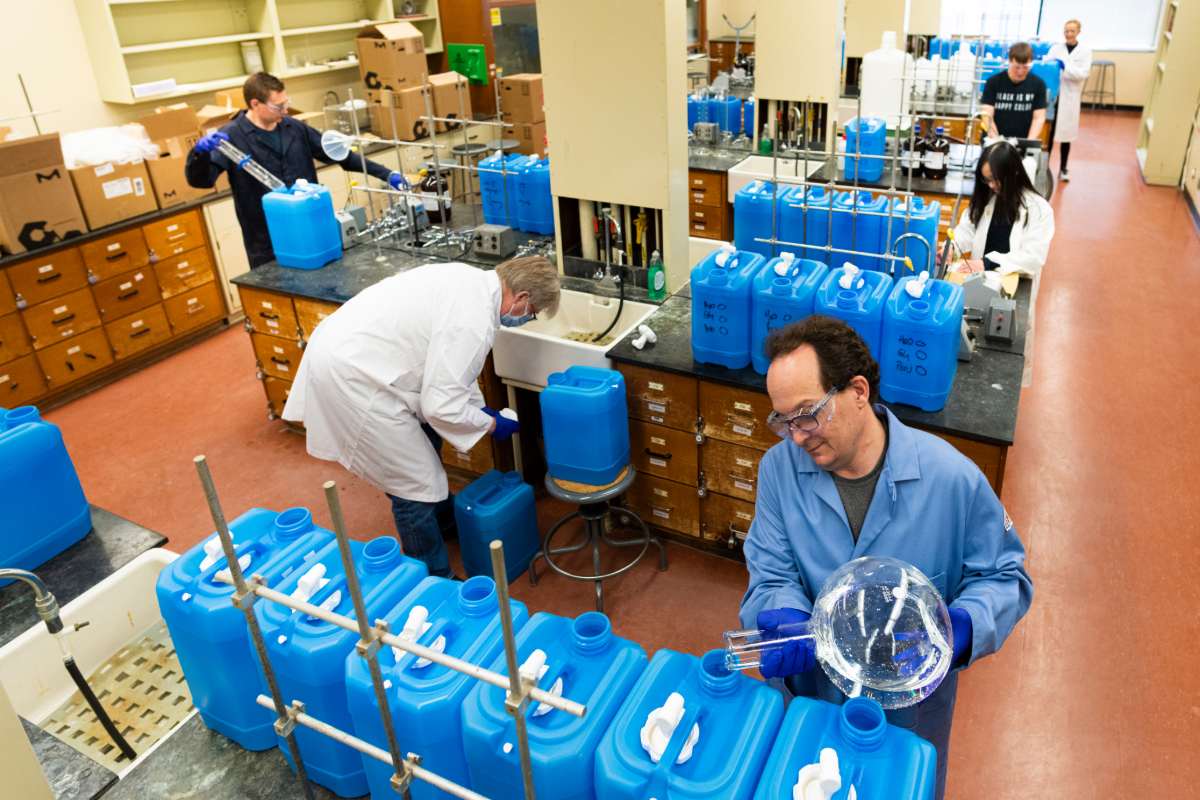
UAlberta chemists in a lab on campus, helping to produce hand sanitizer in the early days of the COVID-19 pandemic. Photo credit: John Ulan
In the early days of the COVID-19 pandemic, certain supplies became scarce almost immediately, including one that’s become an integral part of our daily lives: hand sanitizer. When the global challenge of medical supply shortages loomed, scientists in the Department of Chemistry leapt into action—and into the lab—to produce hand sanitizer right at home at the University of Alberta.
“Our initial batch was created to be shared with the University of Alberta community, but we’ve since gone on to provide sanitizer for the City of Edmonton, local elementary and high schools, Boyle Street Community Services, and several rural and Indigenous communities across the province,” says Rik Tykwinski, professor and chair (chemistry).
The team used the formula recommended by the World Health Organization (WHO), making roughly 200 litres in the first round of production—stopping only when they ran out of bottles. Since those early days in March, they’ve gone on to produce and distribute nearly 1,600 litres of sanitizer.
Those critical supplies have been distributed and put to use across Edmonton and Alberta. The recipients included the Bissell Centre, which works to help members of our community out of poverty, and the Edmonton Food Bank, but also initiatives across the province, including the Rural Health Professionals Action Plan (RHPAP), a non-profit organization and collaborative partner for rural Alberta communities trying to achieve greater access to health care. Through RHPAP, 200 litres of sanitizer were distributed for use in the town of High Level.
“In the early days of the pandemic, there were a lot of unknowns and a lot of anxiety,” says Tykwinski. “Amongst my colleagues in the Department of Chemistry, there was a general sense of ‘what can we do?’ Everything we need for the WHO formulation was available in the department, finding volunteers was easy, and the dean was amazingly supportive—it was obvious this was what we should do.”
As for the inspiration for the idea, the team credits the efforts of the wider scientific community. After seeing a report from the United States, Jillian Buriak (chemistry) suggested the department could help by making hand sanitizer to donate to the community.
“While we believe we were the first university in Canada to undertake production, we give credit to our colleagues in chemistry departments around the world—they were our inspiration,” says Buriak.
She says the team took strict measures to observe all Alberta government health recommendations while working in the lab, including physical distancing
While the initial spike in demand for hand sanitizer has fallen off as production has increased worldwide, faculty and staff at the university continue to contribute in other ways to the global fight against COVID-19.
“Sanitizer is now readily available commercially, and for the last couple of months our department has been able to again focus on research and teaching, with appropriate precautions, of course,” says Tykwinski. “We have several of our researchers in the department and across campus who are collaborating with scientists and colleagues around the globe to search for a vaccine for this global pandemic.”
Thank you to Rik Tykwinski, Jillian Buriak, Jonathan Veinot, Vladimir Michaelis, Andrew Yeung, Laura Pham, their teams, and everyone involved!
The Alberta government recommends several steps you can take to reduce the spread of COVID-19. To protect yourself and others:
- Keep at least 2 metres (about the length of a hockey stick) from people outside your household or cohort group
- Follow Alberta’s mandatory restrictions on gatherings
- Avoid overcrowding in elevators or other enclosed spaces
- Wash or sanitize your hands after touching communal surfaces
- Wear a mask in public when distancing is not possible